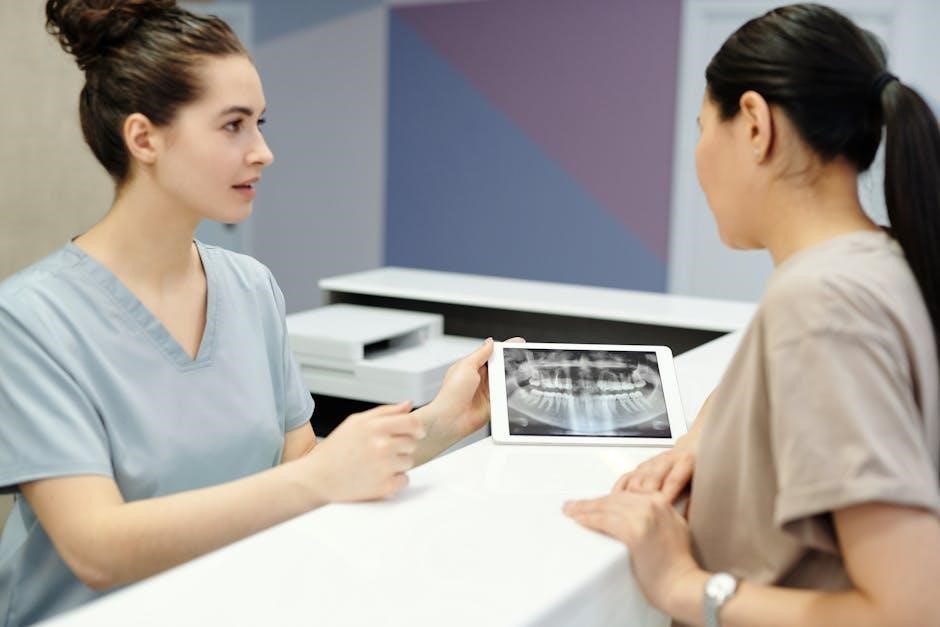Effective front desk management is crucial for dental practices, ensuring smooth patient flow and excellent care. This training manual covers essential skills, from communication to HIPAA compliance, helping staff excel in their roles and enhance patient satisfaction through efficient scheduling, financial management, and administrative tasks.
1.1 Importance of Front Desk Staff in Dental Practices
The front desk staff plays a vital role in dental practices as they are the first point of contact, ensuring a positive initial impression. They efficiently manage scheduling, patient records, and financial transactions, including handling insurance and payments, while maintaining HIPAA compliance. Their effective communication skills help build trust and ensure patient satisfaction, making them crucial for the smooth operation and reputation of the practice.
1.2 Overview of the Dental Front Desk Training Manual
This manual provides a comprehensive guide for front desk staff, covering key areas such as patient communication, scheduling, HIPAA compliance, and financial management. It also includes strategies for handling emergencies, using dental software, and maintaining patient records. Designed for both new and experienced staff, the manual offers practical tips to enhance efficiency and ensure a positive patient experience, promoting continuous improvement and satisfaction.
Patient Communication and Interactions
Effective communication is vital for building trust and ensuring positive patient experiences. This section emphasizes greeting techniques, active listening, and empathetic interactions to foster strong patient relationships.
2.1 Greeting Patients and First Impressions
A warm and welcoming greeting sets the tone for a positive visit. Address patients by name, maintain eye contact, and offer a genuine smile. Promptly acknowledge their arrival and ensure a seamless check-in process. First impressions significantly influence patient satisfaction and loyalty, making it essential to create a comfortable and respectful environment from the start.
2.2 Effective Communication Techniques
Active listening, clear language, and empathy are key to effective communication. Use open-ended questions to understand patient needs and ensure clear explanations of procedures. Maintain eye contact, be aware of non-verbal cues, and adapt communication to suit individual preferences. Show genuine care and patience, ensuring patients feel heard and valued. This fosters trust and enhances the overall patient experience.
2.4 Handling Difficult Patient Situations
Stay calm and professional when addressing conflicts. Listen actively to patient concerns, acknowledge their feelings, and offer solutions. Empathy and patience are key. De-escalate tensions by remaining composed and avoiding arguments. Clearly explain policies and options while maintaining a respectful tone. Know when to involve a supervisor if situations escalate. Prioritize patient safety and well-being in all interactions.

Scheduling and Appointment Management
Effective scheduling ensures smooth patient flow and minimizes no-shows. Implement best practices like sending reminders and offering flexible time slots to enhance patient satisfaction and office efficiency.
3.1 Best Practices for Scheduling Appointments
Adopting best practices ensures efficient scheduling, enhancing patient satisfaction. Use dental software to manage appointments, send reminders via email or text, and maintain a balanced schedule with realistic time blocks. Train staff to handle cancellations promptly and offer flexible options to accommodate patient needs, reducing no-shows and optimizing practice productivity effectively.
3.2 Managing Cancellations and No-Shows
Minimizing cancellations and no-shows is vital for practice productivity. Implement a confirmation process with reminders via phone, email, or text. Train staff to handle cancellations professionally, offering alternative appointments. Use dental software to track patterns and identify trends. Develop a policy for late cancellations and no-shows, ensuring clear communication. Regular follow-ups and flexible scheduling can reduce occurrences and maintain patient trust.

HIPAA Compliance and Patient Privacy
Ensuring HIPAA compliance is essential for protecting patient privacy. Dental staff must safeguard PHI, follow confidentiality protocols, and stay updated on regulations to maintain trust and avoid violations.
4.1 Understanding HIPAA Guidelines
Understanding HIPAA guidelines is vital for dental staff to protect patient health information. These regulations outline strict rules for handling PHI, ensuring confidentiality, and limiting disclosure without consent. Compliance involves secure storage, transmission, and access controls. Training covers key principles, such as patient rights and breach notification, to maintain trust and avoid legal consequences. Adherence is non-negotiable in dental practices.
4.2 Maintaining Patient Confidentiality
Maintaining patient confidentiality is a cornerstone of ethical dental practice. Front desk staff must handle PHI discreetly, avoiding unauthorized disclosures. This includes secure storage of records, limiting access, and using encrypted communication. Training emphasizes minimizing discussions in public areas and verifying patient identities before sharing information. Breaches can damage trust and lead to legal action, making confidentiality a top priority in daily operations.
Financial and Insurance Management
Efficient financial management ensures smooth transactions and insurance processing. Front desk staff must accurately handle payments, verify insurance coverage, and maintain clear records for transparency and compliance.
5.1 Processing Payments and Handling Financial Transactions
Processing payments and handling financial transactions efficiently is vital for dental practices. Front desk staff must be adept at managing various payment methods, ensuring accuracy, and maintaining patient confidentiality. They should also handle insurance claims, verify coverage, and resolve billing discrepancies promptly. Proper documentation and compliance with financial regulations are essential to avoid errors and ensure smooth operations.
5.2 Understanding Dental Insurance Plans
Understanding dental insurance plans is critical for front desk staff to efficiently manage patient claims and payments. This involves knowing plan details, coverage limits, and exclusions. Staff should verify eligibility, process pre-authorizations, and explain benefits clearly to patients. Accurate handling of insurance claims ensures timely reimbursement and minimizes financial disputes, fostering trust and satisfaction among patients.
Dental Software and Technology
Dental software enhances practice efficiency, streamlining tasks like scheduling, billing, and patient records. It improves accuracy and patient care, fostering a modern dental practice environment.
6.1 Overview of Dental Practice Management Software
Dental practice management software streamlines operations, integrating scheduling, billing, and patient records. It enhances efficiency, reduces errors, and improves patient communication. Key features include appointment reminders, insurance claims management, and data analytics, enabling practices to operate smoothly and deliver superior care. Proper training ensures staff can maximize these tools, boosting productivity and patient satisfaction.
6.2 Using Software for Scheduling and Billing
Efficient scheduling and billing are vital for dental practices. Software tools allow staff to manage appointments, send reminders, and track patient visits. For billing, these systems automate insurance claims, generate invoices, and process payments securely. Proper training ensures accurate and timely financial transactions, reducing errors and improving patient satisfaction while maintaining seamless office operations and financial stability.

Administrative Tasks and Record-Keeping
Administrative tasks include maintaining accurate patient records, managing office supplies, and ensuring compliance with HIPAA. Proper organization and documentation are essential for efficient practice operations and patient care.
7.1 Maintaining Patient Records
Maintaining accurate and secure patient records is essential for efficient dental practice management. This involves organizing files, ensuring HIPAA compliance, and keeping records accessible for authorized staff. Proper documentation includes treatment plans, medical histories, and consent forms. Regularly updating records and storing them securely protects patient confidentiality and ensures data integrity. Training staff on record-keeping best practices is vital for compliance and effective patient care. Accurate records also support seamless communication between dental teams and patients.
7.2 Managing Office Supplies and Materials
Efficiently managing office supplies ensures the dental practice runs smoothly. This includes monitoring inventory levels, ordering necessary materials, and organizing storage areas. Proper management prevents shortages, reduces waste, and optimizes costs. Staff should be trained to track supply usage and report needs promptly. Regular audits help maintain adequate stock levels, ensuring the practice remains well-equipped to deliver quality patient care without interruptions. Organized supply management supports a productive work environment.

Handling Emergencies and Urgent Situations
Emergencies require prompt action. Front desk staff must know protocols for dental crises, communicate clearly, and document incidents. Preparedness ensures patient safety and efficient care delivery.
8.1 Protocols for Dental Emergencies
Dental emergencies require immediate attention. Protocols include assessing the situation, providing first aid, and escalating if necessary. Front desk staff must activate emergency response systems, notify the dental team, and ensure patient safety. Clear communication and adherence to established procedures are critical. Proper documentation and follow-up are essential to ensure effective care and compliance with guidelines. Preparation and quick action are vital to manage crises efficiently.
8.2 Communicating with Patients in Crisis
Effective communication with patients in crisis involves active listening, empathy, and clear, reassuring language. Stay calm, acknowledge their concerns, and provide concise information. Use non-verbal cues like eye contact and a comforting tone to build trust. Ensure privacy and maintain professionalism while addressing their needs promptly. This approach helps de-escalate tensions and ensures patients feel supported during stressful situations, fostering a positive experience despite the challenges.
Best Practices for a Positive Patient Experience
A welcoming environment, personalized greetings, and clear communication are key to ensuring patient satisfaction. Staff should address patients by name, listen actively, and provide thoughtful follow-ups to build trust and loyalty.
9.1 Creating a Welcoming Office Environment
A welcoming office environment enhances patient comfort and satisfaction. Ensure the reception area is clean, well-lit, and decorated with calming colors. Friendly front desk staff should greet patients warmly, address them by name, and offer refreshments. Comfortable seating, current magazines, and soothing music can create a relaxing atmosphere. Clear signage and accessible amenities demonstrate attention to detail and patient-centered care, fostering trust and positive first impressions.
9.2 Follow-Up and Patient Satisfaction
Effective follow-up is key to ensuring patient satisfaction and building long-term relationships. After appointments, a simple phone call or personalized email can show patients you care about their well-being. Checking in post-treatment helps address concerns, gather feedback, and improve services. Consistent follow-up demonstrates commitment to patient care and fosters loyalty, enhancing overall practice success and reputation.
Training and Staff Development
Continuous learning and team collaboration are vital for front desk success. Regular training ensures staff stay updated on best practices, software, and patient communication, fostering a supportive environment.
10.1 Continuous Learning and Professional Growth
Continuous learning is essential for front desk staff to stay updated on industry standards, software, and patient communication. Regular training sessions, workshops, and online courses foster professional growth, ensuring staff are equipped to handle evolving challenges effectively. This ongoing development not only enhances individual skills but also contributes to the overall efficiency and success of the dental practice.
10.2 Team Collaboration and Support
Team collaboration is vital for a well-functioning dental front desk. Encouraging open communication, mutual respect, and shared goals among staff fosters a supportive environment. Regular team meetings, cross-training, and recognizing individual contributions strengthen teamwork, ensuring seamless patient care and office efficiency. A cohesive team not only enhances productivity but also boosts staff morale and job satisfaction, benefiting the entire practice.
Effective front desk training is essential for a thriving dental practice, ensuring excellent patient care and operational efficiency. This manual equips staff with the skills needed to excel.
11.1 Final Thoughts on Effective Front Desk Management
Mastering front desk operations is vital for dental practices, enhancing patient satisfaction and office efficiency. Continuous training, clear communication, and a patient-centric approach ensure long-term success. By implementing strategies from this manual, staff can create a welcoming environment, manage appointments smoothly, and maintain confidentiality, fostering trust and loyalty among patients. Consistency and adaptability are key to sustained excellence in dental front desk management.
11.2 Resources for Further Learning
For continued growth, explore resources like the ADA HIPAA guide, dental ethics manuals, and online courses. Websites such as www.fdiworlddental.org and www.dentist.ie offer valuable tools and updates. Additionally, consider enrolling in workshops or webinars focused on patient communication and practice management to stay informed and enhance your skills in dental front desk operations.
